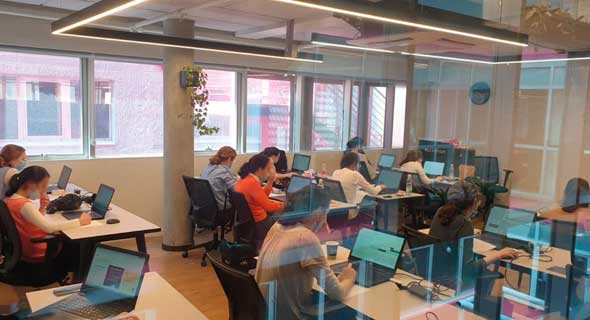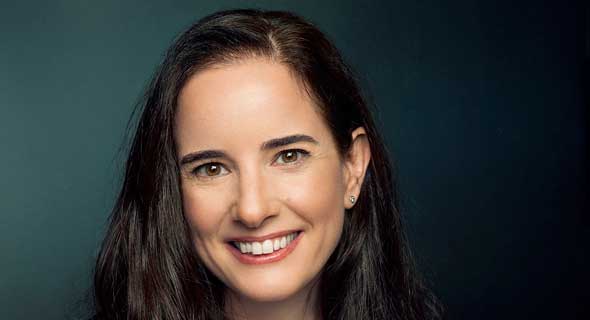Could Ultra-Orthodox women be the solution Israeli tech is looking for?
Battling the human capital scarcity, the Adva program trains Ultra-Orthodox women as developers and helps them enter the local ecosystem
09:3708.09.21
“In my day-to-day I get tasks to do, a lot of coding, debugging sessions, daily meetings, interacting with the team. It is a lot of fun,” said Debbie Alter, a junior backend developer at XM Cyber. A fairly mundane and common comment, until you consider the fact that Debbie Alter is a 21-year-old Ultra-Orthodox woman from Jerusalem.
“A lot of women from my community these days do high tech and computer programming,” Alter explained. “It became a very popular thing to do. It is a very interesting job, a very well-paying job, it is somewhere you can grow, something the world needs now, so it is a very popular thing.”

Ultra Orthodox women participate in the Adva program. Photo: Scale-Up Velocity צילום: Scale-Up Velocity
Alter joined XM Cyber, a risk-based vulnerability management company, which developed a platform that enables companies to respond to risks on their systems, almost six months ago. And so far, despite the big change in scenery, she feels at home. “They did not have to do anything special for us, but they were very very respectful. They knew we have certain boundaries and we won’t participate in certain events,” she said. “In XM, it was a new thing, me and my two friends from Scale-Up were a new thing for them.”
“More than 90% employment”
The “Scale-Up” Alter mentioned is short for Scale-Up Velocity by Start-Up Nation Central - a not-for-profit organization that was launched to develop impactful initiatives and solutions for the high-tech industry’s human capital shortage. It operates several successful programs targeting less represented groups in tech including Ultra-Orthodox Jews and Arab men and women. Alter took part in the Adva program, which is celebrating its third year this month. It is a two-year program, targeting Ultra-Orthodox women and providing them with the same education, sometimes even the same professors, as the leading computer science program in Israeli universities, training them as fullstack and backend developers. Its first class graduated almost a year ago while its second will this month.
“Our program offers two years, with the same academic demands as The Hebrew University and Tel Aviv University,” said Anat Greemland, VP of Strategy at Scale-Up Velocity and head of the Adva program. “The industry is interested in us because the workplace is pivoting from academic degrees to knowledge and experience. It is a slow transformation, but at the end of the day, recruiters, or at least those we work with, want to find those who can meet the industry’s standards and survive the first year of work.”
“The Adva program was born around three years ago,” Greemland explained. “Start-Up Nation Central has its annual report that usually says there is a shortage of manpower, and the idea was not to go to the same well again but to find new resources, including women, Ultra-Orthodox and Arabs.”
“The program was created in cooperation with the Haredi Institute for Public Affairs, with the idea that on the one hand, our clients are the tech companies and how do we deliver to them quality graduates and in droves. On the other hand, we wanted to make sure the program fits the Ultra-Orthodox community,” she added, not forgetting to mention the local ecosystem’s contribution to the project. “We brought in the industry, meaning we have a steering committee with leading figures from Google, IBM, Apple, and Mobileye, to define the graduate profile they would like to have.”

Anat Greemland, VP of Strategy at Scale-Up Velocity and head of the Adva program. Photo: Miri Davidovitzצילום: מירי דוידוביץ
And this cooperation between all the unlikely partners seems to be working very well so far. “So the program’s first class graduated last October, we have more than 90% employment with wages as big as three times the average salary of a software program seminar-graduate,” Greemland said. “I think everyone is impressed how we did something different, and new, in only two years when all of our co-workers did it in three or four years,” Alter added about how she thinks her new colleagues see her and her friends.
Just like a university graduate
“They do everything, develop, troubleshoot, go in-depth into an infrastructure with a large code legacy that you have to be able to understand, and they do it all,” said Gera Drofman, VP of Network Security Products at Check Point about the two Adva graduates his department employs. “They are not shy, they ask questions and participate, which is very important in our work.”
Dorfman learned about the program by chance, with someone posting a message in a WhatsApp group that Adva was looking for tech recruiters for help. “Originally, I was asked to help out with interview training for the program, but I told them if I see someone I like I would want them to interview for us,” he said. And in fact, Check Point has been so pleased with the women, that Dorfman asked the program to test all its current students and see if they can join the cybersecurity company.
“They have a great attitude, and we see them, with their tasks and assignments, as we see every other university graduate,” he concluded.
English and math for Ultra-Orthodox girls
Ultra-Orthodox involvement and inclusion in Israeli society in general and in the workforce, in particular, is a hot-button issue for many Israelis. According to the Israel Democracy Institute’s annual report on the Ultra-Orthodox community in 2020, 77% of Ultra-Orthodox women ages 25-64 are employed, compared to 53% of men of the same age. And while the number of women working has been on a constant rise, both figures are lower than non Ultra-Orthodox Jewish Israelis.
“The Ultra-Orthodox sector and more specifically, Ultra-Orthodox women, is a group, that once we figure out the right model for it, we will reach a growing mass of quality people in little time,” Greemland said about the potential of the project and the community, highlighting that it is not all about the tech industry’s best interests. “This understanding came alongside the need from within the Ultra-Orthodox schools and community to find employment for the girls, who were having a hard time finding a good-paying job.”
Building such a program for a population that often rejects technology and secular education was not easy, and Greemland and her team ran into several hurdles. “During our first class, we realized there is a need to go over math and English, so that class had to get everyone on the same level while on the go. So they covered advanced math and studied English throughout the program. What we did for the second cohort was we opened a math summer class before the program began.”
“As a result of the understanding within the Ultra-Orthodox community that there is a real need for math and English studies, thanks to the Adva program, girls in Ultra-Orthodox high schools study those subjects from the tenth grade, it is a by-product of the program,” she explained, while emphasizing that “our program does not ask any of the girls to change their way of life, we offer them the chance to find a place in the tech industry by choosing their path.”
Related articles
And for those concerned that this growing connection with Israeli mainstream will weaken Adva participants’ faith and conviction, Alter offers her confident point of view. “I think our priority as Ultra-Orthodox stays the same, what is important to us, what we keep, there is no change. But I think we are more ready, more able to adapt to other circles and work and interact with other circles, and know how to do it, without affecting our priorities.”



